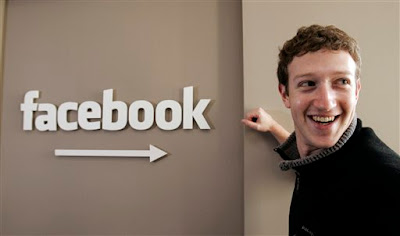
Monday, March 31, 2008
Tuesday, March 25, 2008
Facebook = Facebooo?

"Everywhere and nowhere" claimed the Economist... sayin that.. it's a big thing (duh) but doesn't make any money actually... (seriously?) your take.. and jump here
Monday, March 24, 2008
PR & Marketing people should read this
If you work in PR or marketing, a negative review, preview, or editorial column about the company or product you represent is going to happen. It doesn't matter how much people love the stuff you're hawking. It's only a matter of time. Over the last decade or so, I've dealt with companies that take bad news very well, and I've dealt with ones that seem to do everything wrong. Today I offer some free advice to anyone working with a member of the press for what to do when this inevitably happens.
There's an old saying, attributed to Mark Twain: Never pick a fight with someone who buys ink by the barrel.
Arguing with the press about why they're wrong in their opinion of your product or company isn't going to get you anywhere. If you tick them off, they'll just continually think about how awful you are, and it'll show up in print (or on the Web, or wherever). It'll taint future reviews. And even if you vow not to work with them anymore, it won't stop them from writing nasty things about your company or product. So what do you do when something negative about your product/service/company shows up in the media? Here are five rules:
- Engage immediately: Don't let weeks go by without contacting that person. Letting bad press "sit there" is almost always a recipe for disaster, especially in this age where comments, blogs, and other Web sites pick up on controversial stories. Talking to the person on the phone is best; don't just fire off a big email missive. You want to actively diffuse the situation, not take a "ignore it and it'll go away" attitude.
- Listen more, talk less: If the reviewer makes a factual error, it's fine to point it out and correct it, but don't go any further than that. Instead, you want to ask the person what their complaints are and try to understand them better. Find out what they didn't like, how they came to that conclusion, and take notes. The press hates being told how to do their job, and loves being listened to.
- Answer previous concerns directly: The next product will undoubtedly address some of the things the press complained about in their negative coverage. As soon as you're able to talk about it, go back to the person and say "hey, we have this new Sprocket 2 coming out and we wanted to tell you how it addresses those things you complained about with the original Sprocket. We think you'll be really happy with it." The impression that you want to give is not one of hating the press for saying bad things about the Sprocket, but of finding their negative coverage to be a valuable tool to developing a better product. Even if it's not entirely true, it makes the press feel better about doing their job.
- Don't let a negative review be the most recent one: We see this a lot in companies that make a lot of similar products. If tech analyst Robert Heron over at PC Magazine reviews your HDTV and gives it a low score, the absolute worst thing you can do is stop sending TVs. Now the site's most recent review from your brand is negative. What you want to do is immediately send out another TV that you think will get a better review. You want readers to have a positive impression of your brand.
- Don't try to "fix it": For the most part, a negative review can't be un-done, and a negative editorial column is even further out of reach. If you're lucky, the author made a couple of factual errors and will revise their opinion on their own, once you point them out. If they had their facts straight and still hold an unfavorable opinion, trying to convince them to "take another look" or "re-review" your stuff is probably only going to make things worse. Sometimes the author will decide to do this on their own, but forcing the issue is like controlling the press, and the press will hate that. Just pay attention to #2 and #4 above, and make it clear that the author can always contact you with any questions or needs as they work on their future coverage.
Look, almost all companies mess up from time to time. Bad products are going to happen, and the worst part about being in PR or marketing has to be putting on a happy face and defending something you know really isn't that good. I know that I personally appreciate the kind of honesty where a company will admit to having a less-than-ideal product, but most people in PR or marketing don't have the luxury of doing that. It's when a company takes the exact opposite attitude that I get my feathers ruffled—when anything less than a most glowing review is unacceptable. Remember that a confrontation with the press is almost always going to end in more bad press, and a conciliatory tone can pay off big further down the line.
ExtremeTech
19 March 2008
Saturday, March 15, 2008
Monday, March 10, 2008
TO ALL WOULD-BE ADVERTISER OUT THERE!
====================================================================
How to advertist in-game...the RIGHT way
By Kristin
The first instance that I can remember of in-game advertising that I saw with my own eyes was in Grand Theft Auto: Vice City. These ads were all for fictional companies and spoofs on current advertising at the time. Along with the radio commercials. Who didn't love to drive around in the car and listen to the various stations? Heck, I even had an entire GTA:VC loop on in my winamp at one point in time!
The next well executed in-game advertising was in Crackdown. Again, all fictional companies, it was fun to jump around the city and see the billboards, trying to figure out what real life life company they were spoofing.
Then came Guitar Hero 3 with the blatant, over the top, real life company ads. Who REALLY wants to see that huge McDonald's logo? When I started playing and noticing the advertising in the game and how utterly OBNOXIOUS it was, it made me want to boycott those companies that paid to have their ads inserted into the game. Your advertising is on the radio (why I listen to CDs), the television (why I play games and watch movies, I catch my tv shows online), and on billboards (why I watch the cars tail lights in front of me), don't invade my private zone of "my gametime". This is where I go to escape mainstream and life.
However, I do think mainstream advertising can be done well in games. This generation hates anything that smells of marketing unless it's VERY well done, edgy, comical, and memorable.
Cat herding anyone? Yes, you remember that super bowl commercial. It was funny, it's different, it was completely unexpected. Those weird little troll-like-things that quizno did a couple years ago that sang about the moon? Yeah you remember what I'm talking about.
In game marketing can be done successfully, the best way to do it would be to make up a fictions company that is a spoof of your real life company. It makes the gamer see the ad, go oh! That's XYZ company in real life they're spoofing, and they appreciate the company poking fun at itself (although the gamer may not realize the company paid for a spoofed ad - they may think it's the game designer spoofing a company).
You get brand recognition (McDonalds could have flipped their arches to spoof themselves, and shrunk the ad, Gamers LOVE to find easter eggs in games), you get the consumer thinking about your brand, and as they go by your establishment/product on the road/in the store it'll trigger a memory of the game -> trigger memory of your brand -> if executed correctly brand loyalty and a purchase.
I saw some concept art at one point for a blackbird campaign that had in game advertising. It was AWFUL. I'm so thankful everyone that saw the concepts reacted with the same visceral distaste and disgust that I did. Guess why it sucked so bad - it wasn't designed by gamers. Notice the Voodoo laptops in Call of Duty 4? Very understated, very subtle, very sexy. Why use 1 million words when 1 will do?
It can be done people. Just don't let suits design the ads. When your designing for your demographic, ASK your demographic or even better yet; have YOUR demographic design it.
Kristin Reilly
(www.rahulsood.com)
(http://www.rahulsood.com/2008/03/how-to-advertist-in-gamethe-right-way.html)
==============================================================
there u have it.. a nice n neat article on how to advertise in video games... to all the bald man (or white haired or whatever) in suites... this may as well become your reference text when you guys are going to put some advertisement in video games in the future...
and make sure whoever have even a tiny bit of interest in pc gaming / video games industry as a whole checkout rahulsood's blog! over n out...
Saturday, February 16, 2008
the ultraslims and the race for perfection
the wonderful world of electronics & computing technology

